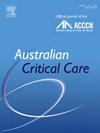一项针对重症监护患者的早期精神评估、转诊和干预研究的先导随机对照试验的结果
IF 2.7
3区 医学
Q2 CRITICAL CARE MEDICINE
引用次数: 0
摘要
重症监护病房(ICU)幸存者可能会经历身体、认知或心理障碍,这些障碍会对长期生活质量产生不利影响。这项开放标签、单地点、双臂平行、试点随机对照试验的目的是评估将精神病学会诊纳入现有icu后临床的可行性和可接受性。方法邀请icu后门诊人员参与。同意的参与者被分配到常规治疗加精神病学审查或常规治疗使用块随机化。当参加诊所时,参与者完成了一系列标准的结果测量,随后进行了非结构化的临床访谈。干预组还在2周内进行了一次精神病学咨询,重点是诊断澄清和心理教育。所有参与者在预约后完成了可接受性测量。约6个月后,参与者重复结果测量和额外的问卷调查。对数据进行描述性分析。成本分析评估了精神病医生提供这种干预所需的时间和成本。结果53例临床参与者中,25例(47%)被邀请参加;11人(44%)同意,10人(91%)完成随访。两组参与者都认为所提供的干预措施是可以接受的。在10分制的可接受性量表上,对照组的平均结果为7.9,而干预组的平均结果为9.0。在6个月的随访中,平均医院焦虑和抑郁量表焦虑亚量表在对照组从2.0增加到8.0,而在干预组从8.8减少到4.9。对照组的抑郁量表从2.7增加到6.1,干预组的抑郁量表从9.8减少到6.3。对照组的创伤后应激障碍诊断与统计手册(DSM)-5平均得分从54.0降至23.3,干预组从24.3降至6.1。一名精神科医生每周提供两次半天的门诊,最多可以为368名病人看病,每年为当地服务部门花费63,100澳元。结论将精神病学评估纳入标准的重症监护后门诊是可以接受和可行的。随机对照试验应进一步评估这种干预的临床疗效。本文章由计算机程序翻译,如有差异,请以英文原文为准。
Findings of a pilot randomised controlled trial of an early psychiatric assessment, referral, and intervention study for intensive care patients
Introduction
Intensive care unit (ICU) survivors can experience physical, cognitive, or psychological impairments that adversely affect long-term quality of life. The aim of this open-label, single-site, two-arm parallel, pilot randomised controlled trial was to assess the feasibility and acceptability of incorporating a psychiatric consultation into an existing post-ICU clinic.
Methods
Post-ICU clinic attendees were invited to participate. Consenting participants were allocated to either treatment as usual plus psychiatric review or treatment as usual using block randomisation. When attending the clinic, participants completed a standard battery of outcome measures followed by an unstructured clinical interview. The intervention arm also had a psychiatric consultation focusing on diagnostic clarification and psychoeducation within 2 weeks. All participants completed an acceptability measure after their appointment. Approximately 6 months after their appointment, participants repeated outcome measures and additional questionnaires. Data were analysed descriptively. A cost analysis assessed the time taken and cost for a psychiatrist to deliver such an intervention.
Results
Of 53 clinic attendees, 25 (47%) were invited to participate; 11 (44%) individuals consented, and 10 (91%) completed follow-up. Participants in both arms rated the interventions provided as acceptable. On a 10-point acceptability scale, the mean result for the control was 7.9 compared to 9.0 for the intervention. At 6-month follow-up, mean Hospital Anxiety and Depression Scale Anxiety subscales increased from 2.0 to 8.0 for controls but reduced from 8.8 to 4.9 for the intervention arm. Depression subscales increased from 2.7 to 6.1 for controls but reduced from 9.8 to 6.3 for the intervention arm. Mean Post-Traumatic Stress Disorder Checklist for Diagnostic and Statistical Manual (DSM)-5 scores reduced from 54.0 to 23.3 for controls and 24.3 to 6.1 for the intervention arm. A psychiatrist providing two half-day clinics weekly could see up to 368 patients, costing AU$63,100 per year to the local service.
Conclusion
Incorporating a psychiatric assessment with standard postintensive care clinics appears both acceptable and feasible. A randomised controlled trial should further evaluate the clinical efficacy of such an intervention.
求助全文
通过发布文献求助,成功后即可免费获取论文全文。
去求助
来源期刊

Australian Critical Care
NURSING-NURSING
CiteScore
4.90
自引率
9.10%
发文量
148
审稿时长
>12 weeks
期刊介绍:
Australian Critical Care is the official journal of the Australian College of Critical Care Nurses (ACCCN). It is a bi-monthly peer-reviewed journal, providing clinically relevant research, reviews and articles of interest to the critical care community. Australian Critical Care publishes peer-reviewed scholarly papers that report research findings, research-based reviews, discussion papers and commentaries which are of interest to an international readership of critical care practitioners, educators, administrators and researchers. Interprofessional articles are welcomed.
 求助内容:
求助内容: 应助结果提醒方式:
应助结果提醒方式:


